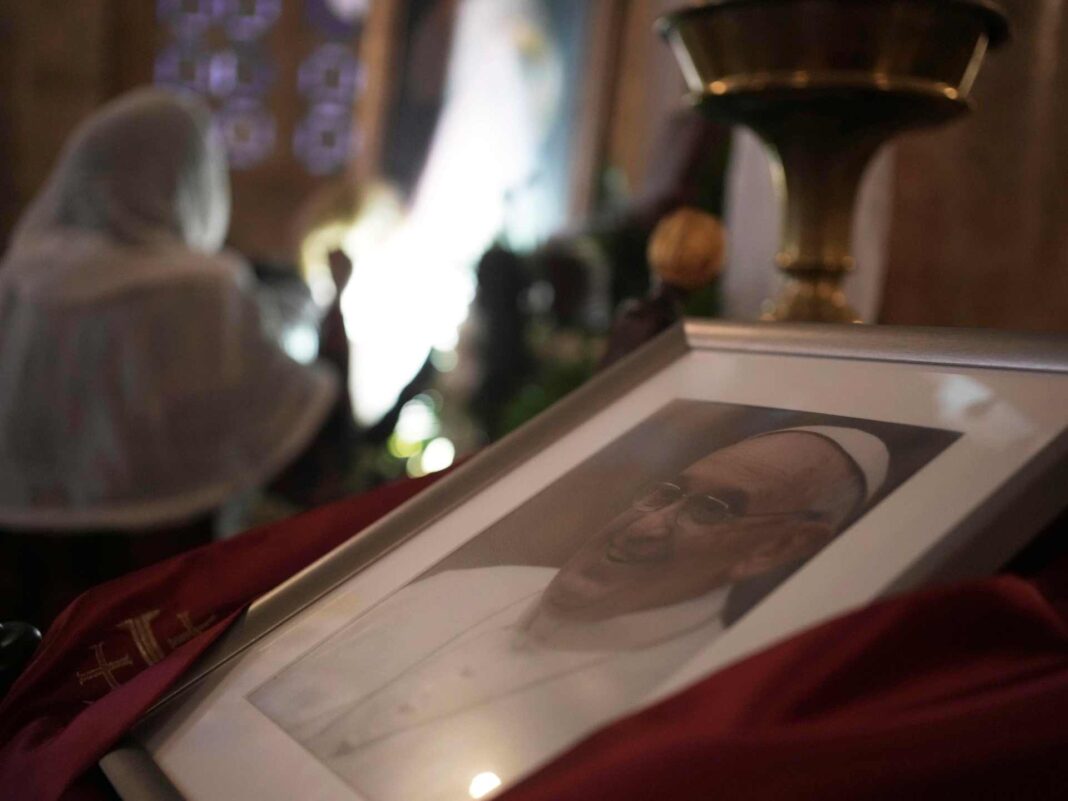Pope Francis died today at the age of 88 following a prolonged illness. Just yesterday, in his Easter Sunday address in Saint Peter’s Square in Vatican City, the leader of the Roman Catholic Church chose to express his “closeness to the sufferings of Christians in Palestine and Israel, and to all the Israeli people and the Palestinian people”.
He went on to state that he was “think[ing] of the people of Gaza, and its Christian community in particular, where the terrible conflict continues to cause death and destruction and to create a dramatic and deplorable humanitarian situation” – a toned-down reference, of course, to Israel’s ongoing genocide in the Gaza Strip, which has officially killed more than 51,200 Palestinians since October 2023.
Concluding the pope’s thoughts on this particular “terrible conflict” was an “appeal to the warring parties: call a ceasefire, release the hostages and come to the aid of a starving people that aspires to a future of peace!”
To be sure, Pope Francis opted to deploy language that does not adequately reflect the horrors currently being unleashed upon Gaza. For one thing, a genocide is not a “conflict”; nor are Israeli genocidaires and Palestinian victims of genocide equal “warring parties”.
That said, the pope deserves praise for utilising what would be his final platform to call for a ceasefire in Gaza – at a time when the world appears all too content to allow the mass slaughter of Palestinians to proceed indefinitely.
Though he did not pinpoint who precisely is to blame for the fact that there are now “starving people” in need of aid, this is naturally a reference to Israel’s decision in early March to cut off all humanitarian aid deliveries to the Gaza Strip – a move amounting to enforced starvation and a war crime.
Pope Francis’s call for a ceasefire yesterday came just a month after Israel’s definitive annihilation of the existing ceasefire that ostensibly took effect in January, which the Israeli military had already taken the opportunity to violate at every turn.
Between Israel’s termination of the ceasefire on March 18 and April 9, the United Nations found that, in at least 36 separate Israeli air strikes on Gaza, women and children were the only fatalities.
As much as the starving people may “aspire to a future of peace”, then, it’s difficult to aspire to any future at all when you’re being actively exterminated by an army that enjoys the full bipartisan support of the reigning global superpower, the United States of America.
Incidentally, Pope Francis’s final day on Earth also included a brief meeting with said superpower’s second-in-command: US Vice President JD Vance. The encounter came after the head of the Catholic Church openly and repeatedly criticised US President Donald Trump’s administration and its maniacal deportation schemes. In a February address, he noted that its immigration policies were causing a “major crisis” that “damages the dignity of men and women”.
Pope Francis made a nod to the plight of people on the move in his Easter address as well: “How much contempt is stirred up at times towards the vulnerable, the marginalised, and migrants!”
He went on to reiterate his desire “to renew our hope that peace is possible”.
Unfortunately, however, contempt and dehumanisation are pillars of a hopeless global system – led by the United States – that prioritises elite tyranny and profit over any semblance of human decency. Whether it’s the arms industry making bank off of Israel’s genocide in Gaza or the US making life hell for the undocumented folks on whose labour the country’s own economy depends, institutionalised contempt is good for business.
This Easter week, the “hope that peace is possible” was entirely out of the question for Palestinian Christians in Gaza, the Israeli-occupied West Bank, and Jerusalem – the very place Jesus was crucified, according to the Bible.
In the Gaza Strip, Christians gathered in fear on Easter Sunday at Gaza City’s Church of Saint Porphyrius, which was bombed in October 2023 shortly after the start of the genocide. The attack killed at least 18 displaced Palestinians who were sheltering there, including Christians.
In the West Bank and Jerusalem, Israeli officials thwarted access to holy sites for numerous members of the Christian community, which has suffered increasing attacks by Jewish settlers and other forms of state-backed persecution.
Only approximately 6,000 West Bank Palestinians received permits from Israel to attend Easter services this year at the Church of the Holy Sepulchre in occupied East Jerusalem, which was predictably militarised for the occasion.
As Al Jazeera noted, “even the representative of the Vatican in Palestine was denied entry into the church”.
A day later, the earthly representative of the Roman Catholic Church itself passed on to other realms. Among his parting appeals was the call for a ceasefire in Gaza. Will anyone listen?
The views expressed in this article are the author’s own and do not necessarily reflect Al Jazeera’s editorial stance.


